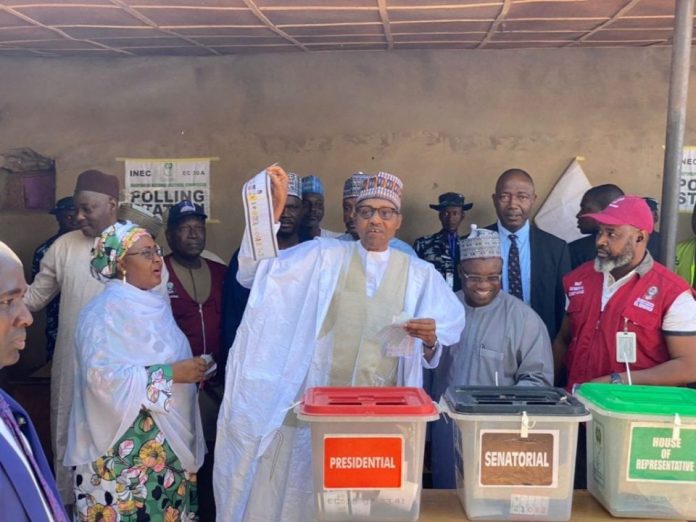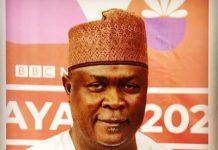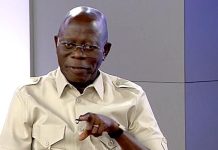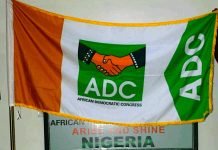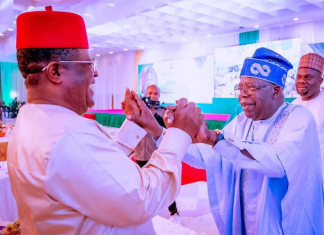A human rights organisation, Centre for Transparency Advocacy on Sunday slammed the President, Major General Muhammadu Buhari (retd.), for publicly displaying his ballot paper after voting in Daura, during the presidential and National Assembly elections.
While describing the action as vote selling and a violation of the Electoral Act, the organisation said the President was clearly canvassing for votes for his candidates contrary to the provision of the law.
The Executive Director of CTA, Faith Nwadishi, stated after the presentation of its preliminary statement on the conduct of the general elections.
She also faulted the action of some politicians who went to the polling units with armed security men and aides contrary to the order given by the Inspector-General of Police.
Nwadishi said, “What the President did is pure canvassing of votes. We also frown at those candidates who come with their aides to polling units. INEC in its guideline literally outlined people who should legally be present on a polling unit. Security Officers, accredited observers, accredited party agents, voters with Permanent Voter Cards assigned to that particular polling unit and candidates if they are voting in that particular polling unit.
“Apart from canvassing, I know that nobody will give money to the President for voting but you can actually accuse him of vote selling, you can accuse him of canvassing, you can also accuse him of disrupting election while it is going on because he also went there with retinue of his aides who were not assigned to that particular polling unit and they were present in that unit on the day of election without proper accreditation.”
“We also frown at this culture of candidates or even senior government officials going to vote with security aides and others when the Inspector General-Police of Police has given an instruction that no candidate should go to the polling unit with armed security agents or more than one. But you see a lot of them and what happens is as soon as they get to the polling unit, they disrupt it.
“Now, the same system is being practised by even community leaders and district heads of communities. They come to the polling unit and they disrupt the voting. They come late and everybody on their entourage, even those that are not even supposed to be present at that polling unit, come to disrupt the electoral process.
“Sadly, the security agents are not arresting them or calling them to question. So we view very seriously the fact that senior political leaders will go to vote and show their own card, and then also come with a retinue of aides to the polling unit and disrupt elections.
“These are two laws that are broken without any consequence by senior political party leaders. If an ordinary citizen had done that, we accused that person of wanting to sell their vote, because that is one strategy.”
A member of the CTA expert team and Deputy Vice-Chancellor (Academic, Research, Innovations and Partnership) at Osun State University, Osogbo, Prof. Anthony Kola-Olusanya, while presenting the organisation’s preliminary statement, said some staff of the Independent National Electoral Commission ad hoc staff demonstrated insufficient familiarity with the operation of the Bimodal Voter Accreditation System.
According to him, observers reported that wrong codes and poor network were some of the challenges faced by the ad-hoc staff
He said, “Reports from our observers across 982 polling units showed that the BVAS worked well in 76 per cent of the polling units. However, there were reported cases of Ad hoc staff not uploading results at the end of polls as stipulated in the guidelines.
“Reports from our field observers deployed indicated that INEC officials and materials generally did not arrive on time at the majority of polling units observed.
“Although, INEC proposed commencement of accreditation is for 8:30am, on average, polling officials and materials did not arrive the polling units before 10:30am. As a result of the late arrival of INEC officials and voting materials, the commencement of voter accreditation and voting started after the 8.30 am.
“However, reports from our observers across 982 polling units so far reported across the country, showed that INEC officials and materials arrived between 7am and 8:30am in 53 per cent of the polling units.
“The late arrival of INEC officials necessitated the need for the setup of the polling units to be hurriedly done and this, in some cases, made the polling officials forget to properly brief the electorates on the proper voting procedures.”
The Varsity don said while security personnel were expected to be on the ground before the commencement of the voting process, observers noted that in most of the polling units, security personnel were not present until about 9 – 10 am.
Kola-Olusanya said, “On average, there were about four security personnel in most of the polling units where our observers were deployed. Generally, observers reported that the security personnel behaved and conducted themselves professionally.
“Also, voter turnout was generally impressive. In most cases, voters came out earlier than the arrival of INEC officials, materials and security personnel. They mostly conducted themselves peacefully and in accordance with voting guidelines.
“Reports from the field indicated in some parts of the country, that political parties and their agents were observed to be involved in acts of intimidation and harassment of voters, especially those suspected to be sympathetic to candidates other than theirs. In some of these cases, these acts were perpetrated in full public glare and in the presence of security personnel.
“Reports from observers indicate that the incidence of open vote buying and selling assumed a new dimension, cash transfers, food vouchers, name and account details collation. This in our view, may not be unconnected with the deployment of the BVAS for the elections and possibly, the effect of the naira redesign policy. Given the mutative nature of vote buying and selling, the phenomenon appears far from being eradicated from the polity.
“In addition to acts of intimidation and harassment, there were cases of violence reported from some states in the country. These include physical injuries and destruction of voting materials.
“As the collation process and election in places where elections were rescheduled continue, we urge all stakeholders to continue to conduct themselves in a peaceful and responsible manner. Specifically, we call on INEC to hold itself to the highest level of neutrality and accountability.”
Join Television Nigerian Whatsapp Now
Join Television Nigerian Facebook Now
Join Television Nigerian Twitter Now
Join Television Nigerian YouTUbe Now

